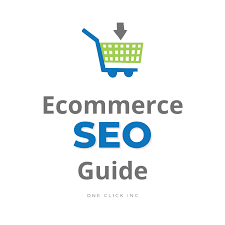The Importance of SEO for Your Ecommerce Website
Search Engine Optimization (SEO) plays a crucial role in the success of any ecommerce website. By optimizing your site for search engines, you can improve your visibility online, attract more organic traffic, and ultimately increase your sales and revenue.
Key SEO Strategies for Ecommerce Websites:
Keyword Research:
Identify relevant keywords that your target audience is using to search for products similar to yours. Incorporate these keywords naturally into your product descriptions, meta tags, and URLs to improve your site’s ranking in search engine results.
Optimized Product Pages:
Create unique and compelling product descriptions that include relevant keywords. Optimize product images with descriptive alt text and file names to improve visibility in image searches.
Mobile-Friendly Design:
Ensure that your ecommerce website is responsive and optimized for mobile devices. With the increasing number of users shopping on smartphones and tablets, a mobile-friendly design is essential for both user experience and SEO rankings.
Site Speed and Performance:
A fast-loading website not only enhances user experience but also improves search engine rankings. Optimize images, reduce server response time, and leverage browser caching to boost site speed.
Quality Backlinks:
Acquire high-quality backlinks from reputable websites to establish credibility and authority in the eyes of search engines. Guest blogging, influencer partnerships, and social media promotion are effective ways to build backlinks.
The Benefits of SEO for Ecommerce Websites:
- Increase Organic Traffic: By ranking higher in search engine results pages (SERPs), you can attract more organic traffic to your ecommerce site without relying solely on paid advertising.
- Enhance User Experience: A well-optimized website with relevant content and easy navigation not only pleases search engines but also improves user engagement and conversion rates.
- Build Brand Awareness: Improved visibility in search results helps build brand awareness among potential customers searching for products or services related to your niche.
- Drive Conversions: With targeted SEO strategies, you can drive qualified traffic to your ecommerce site, leading to increased conversions and sales.
In conclusion, investing in SEO for your ecommerce website is essential for long-term success in the competitive online marketplace. By implementing effective SEO strategies tailored to ecommerce sites, you can improve visibility, attract more customers, and achieve sustainable growth.
Maximizing Visibility: Top 9 SEO FAQs for Ecommerce Website Success
- What is SEO and why is it important for ecommerce websites?
- How can I improve the search engine ranking of my ecommerce website?
- What are the best practices for keyword research in SEO for ecommerce?
- How do I optimize product pages for better SEO performance?
- Is having a mobile-friendly design crucial for SEO on an ecommerce website?
- What role does site speed and performance play in SEO for ecommerce websites?
- How can I build quality backlinks to improve the SEO of my ecommerce site?
- What are some common mistakes to avoid when optimizing an ecommerce website for search engines?
- How long does it typically take to see results from SEO efforts on an ecommerce website?
What is SEO and why is it important for ecommerce websites?
Search Engine Optimization (SEO) is the practice of optimizing a website to improve its visibility and ranking in search engine results pages. For ecommerce websites, SEO is crucial as it helps attract organic traffic, increase online visibility, and drive sales. By incorporating relevant keywords, optimizing product descriptions and images, improving site speed and performance, and building quality backlinks, ecommerce sites can enhance their online presence and reach a wider audience. SEO for ecommerce websites not only boosts search engine rankings but also enhances user experience, builds brand credibility, and ultimately leads to higher conversion rates and revenue generation.
How can I improve the search engine ranking of my ecommerce website?
To improve the search engine ranking of your ecommerce website, it is essential to focus on key SEO strategies tailored to ecommerce sites. Start by conducting thorough keyword research to identify relevant terms that your target audience is using to search for products. Incorporate these keywords strategically into your product descriptions, meta tags, and URLs. Optimize your product pages with unique and engaging content, high-quality images, and mobile-friendly design. Enhance site speed and performance to provide a seamless user experience. Acquire quality backlinks from reputable sources to build authority and credibility. By implementing these SEO best practices consistently, you can boost your ecommerce website’s visibility in search engine results and attract more organic traffic.
What are the best practices for keyword research in SEO for ecommerce?
When it comes to SEO for ecommerce websites, implementing effective keyword research practices is crucial for optimizing your online presence. The best practices for keyword research in ecommerce SEO involve identifying relevant and high-converting keywords that align with your products or services. By understanding the search intent of your target audience, conducting thorough competitor analysis, and utilizing keyword research tools, you can uncover valuable keywords to incorporate into your product descriptions, meta tags, and URLs. Additionally, focusing on long-tail keywords and semantic variations can help you capture more specific search queries and drive qualified traffic to your ecommerce site. By continuously monitoring keyword performance and adapting your strategy accordingly, you can enhance your site’s visibility in search engine results and attract potential customers actively seeking your offerings.
How do I optimize product pages for better SEO performance?
To optimize product pages for better SEO performance on an ecommerce website, focus on several key strategies. Start by conducting thorough keyword research to identify relevant terms that potential customers are using to search for products. Incorporate these keywords strategically in your product titles, descriptions, meta tags, and URLs. Ensure that your product pages load quickly and are mobile-friendly to enhance user experience and improve search engine rankings. Optimize product images with descriptive alt text and file names to make them more discoverable in image searches. Additionally, create unique and compelling product descriptions that not only showcase the features and benefits of the products but also incorporate targeted keywords naturally. By implementing these SEO best practices on your ecommerce product pages, you can increase visibility, attract more organic traffic, and ultimately drive conversions.
Is having a mobile-friendly design crucial for SEO on an ecommerce website?
Having a mobile-friendly design is crucial for SEO on an ecommerce website. With the increasing number of users browsing and shopping on mobile devices, search engines prioritize mobile-friendly websites in their rankings. A responsive design not only enhances user experience but also improves site accessibility and performance on smartphones and tablets. By ensuring that your ecommerce site is optimized for mobile, you can attract more organic traffic, reduce bounce rates, and ultimately boost your SEO rankings, leading to increased visibility and potential sales.
What role does site speed and performance play in SEO for ecommerce websites?
Site speed and performance play a crucial role in SEO for ecommerce websites. Search engines like Google consider page loading speed as a key ranking factor, as it directly impacts user experience. A fast-loading website not only enhances user satisfaction but also reduces bounce rates and increases the likelihood of visitors staying on your site longer. In the competitive world of ecommerce, where every second counts, having a website that loads quickly can significantly improve your search engine rankings, drive more organic traffic, and ultimately lead to higher conversions and sales. Therefore, optimizing site speed and performance is essential for improving SEO for ecommerce websites and providing a seamless browsing experience for customers.
How can I build quality backlinks to improve the SEO of my ecommerce site?
Building quality backlinks is essential for enhancing the SEO of your ecommerce site. One effective way to acquire high-quality backlinks is through guest blogging on reputable websites within your industry. By creating valuable and relevant content that includes a link back to your ecommerce site, you can establish credibility and authority in the eyes of search engines. Additionally, engaging in influencer partnerships, collaborating with industry influencers to promote your products or services, can help you secure quality backlinks from their platforms. Leveraging social media channels to share compelling content and attract natural backlinks is another strategy to consider. By focusing on building authentic and relevant backlinks from authoritative sources, you can improve the visibility and ranking of your ecommerce site in search engine results pages.
What are some common mistakes to avoid when optimizing an ecommerce website for search engines?
When optimizing an ecommerce website for search engines, it is crucial to avoid common mistakes that can hinder your SEO efforts. One common mistake is neglecting to optimize product descriptions and metadata with relevant keywords, which can impact your site’s visibility in search results. Another mistake to avoid is duplicating content across product pages, as this can lead to keyword cannibalization and confusion for search engines. Additionally, overlooking mobile optimization and site speed can result in a poor user experience and lower search engine rankings. By addressing these common mistakes and implementing best practices in SEO for ecommerce websites, you can enhance your online visibility and drive more traffic to your site.
How long does it typically take to see results from SEO efforts on an ecommerce website?
The timeline for seeing results from SEO efforts on an ecommerce website can vary depending on various factors such as the competitiveness of the industry, the current state of the website’s SEO, and the effectiveness of the implemented strategies. In general, it may take several weeks to a few months to start noticing significant improvements in search engine rankings and organic traffic. However, it’s important to understand that SEO is a long-term investment, and consistent efforts over time are required to maintain and improve your website’s performance in search results. By focusing on quality content, relevant keywords, user experience optimization, and link building, ecommerce websites can gradually see positive outcomes from their SEO endeavors.




